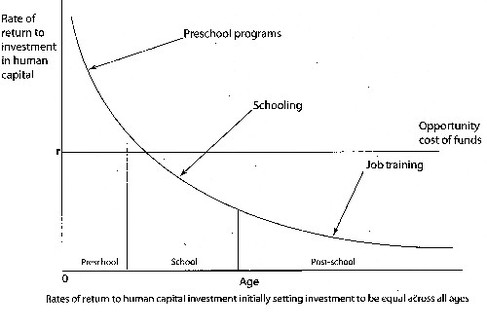
Our "Working Differently" communities have strategically addressed outcomes in early education environments -- most notably k-readiness. There was an intuitive sense in these communities that getting students off to the right start would have the biggest sustainable impact. This was especially true in those communities seeking to break the cycle of inter-generational poverty.
While, in the past, many other community efforts focused on HS graduation, teen pregnancy, criminal justice and college remediation, there has been a growing understanding that the dye is cast on these outcomes at a much earlier age. As with our powerful literacy outcomes with A2i (see complete discussion of A2i - January 23, 2013), focusing on k-3, resources invested and held accountable to achieving outcomes have a markedly higher impact when applied earlier as opposed to later. This is borne out by Nobel Prize winning economist James Heckman's work, which is devoted to the development of a scientific basis for economic policy evaluation. His career has included developing models to study unemployment, wage growth and skill formation. Heckman's report, The Productivity Argument for Investing in Young Children, describes how individual productivity can be fostered by investments in young children, particularly children in poverty or other adverse circumstances.
Figure 1. Rates of Return
The report's findings are based on an analysis of the impact of current workforce conditions, workforce skills, the impact of baby boomer retirements, crime and family environments. For example, the report finds that America's workforce is not gaining in quality or productivity, but rather seeing slower growth. He argues that if this trend continues, there will be fewer educated individuals in the workforce and lower productivity than in previous periods. Key findings of the report include:
Source: Heckman and Masterov, The Productivity Argument for Investing in Young Children, October 2004.
While, in the past, many other community efforts focused on HS graduation, teen pregnancy, criminal justice and college remediation, there has been a growing understanding that the dye is cast on these outcomes at a much earlier age. As with our powerful literacy outcomes with A2i (see complete discussion of A2i - January 23, 2013), focusing on k-3, resources invested and held accountable to achieving outcomes have a markedly higher impact when applied earlier as opposed to later. This is borne out by Nobel Prize winning economist James Heckman's work, which is devoted to the development of a scientific basis for economic policy evaluation. His career has included developing models to study unemployment, wage growth and skill formation. Heckman's report, The Productivity Argument for Investing in Young Children, describes how individual productivity can be fostered by investments in young children, particularly children in poverty or other adverse circumstances.
Figure 1. Rates of Return
The report's findings are based on an analysis of the impact of current workforce conditions, workforce skills, the impact of baby boomer retirements, crime and family environments. For example, the report finds that America's workforce is not gaining in quality or productivity, but rather seeing slower growth. He argues that if this trend continues, there will be fewer educated individuals in the workforce and lower productivity than in previous periods. Key findings of the report include:
- Cognitive and noncognitive abilities are important for a productive workforce, and gaps that emerge early are difficult to change.
- “Skill begets skill and learning begets more learning.” Because skills are accumulated, starting early and over time, investing in young children is an investment in future productivity and public safety.
- Family environments are important in determining education and skills. Growing numbers of children face adverse environments that restrict the development of these skills. Early education and other early interventions such as home visits can mitigate the effects of poor family environments. Key workforce skills such as literacy, motivation, persistence and self-control are developed early. Heckman concludes that 5-12 schooling comes too late, and other remedies are prohibitively costly as well (e.g., job training programs and second-chance GED programs). (See Figure 1.)
Source: Heckman and Masterov, The Productivity Argument for Investing in Young Children, October 2004.
To be tweeted links to my new posts -- blog, book reviews (both nonfiction and fiction), data or other recommended tools -- either go to Twitter.com and follow me @jcrubicon, or just go to my Home page and click on the Twitter button on the right, just above the tweet stream, and follow me @jcrubicon.
 RSS Feed
RSS Feed
